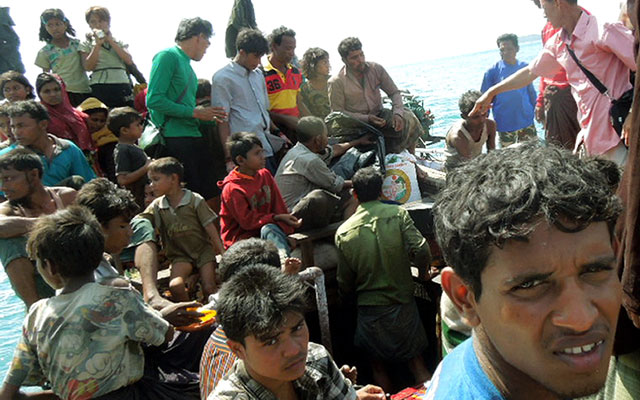Thousands of Rohingya are fleeing Burma
and seeking refuge in Bangladesh, Malaysia, and Thailand only to find
themselves persecuted, trafficked, or homeless. Blatant segregation and
discrimination against the Rohingya has occurred since Burma’s
independence in the late 1940s, but recent tension between Buddhist and
Muslim groups has led to an ever-increasing exodus of Rohingya to
neighboring nations.
“We don’t care if you die here,” taunted Thai traffickers after they kidnapped Ahmed and 60 other Rohingya refugees. Like so many other members of the Rohingya Muslim minority group, Ahmed
fled Burma because he was not legally recognized as a citizen. Unable
to provide for his family, Ahmed hoped to find work in Thailand so he
could send funds back to his wife and eight children. It was not to be.
While in the hands of his captors, Ahmed was beaten with iron bars
and crammed into a small space where he and the other kidnapped Rohingya
were forced to live. The only reason he escaped—bribery.
With Burma shirking its responsibilities, the international community has been left to pick up the pieces.
Thailand recently announced that it will allow Rohingya to stay in Thailand for another six months
while their government works with the U.N. to place them in third
countries. While this is the official statement of the Thai government,
many Rohingya become forced laborers, or are turned away when they arrive at the shores of Thailand.
They have not been warmly received in Bangladesh, either. Of the nearly 300,000 Rohingya escaped from Burma, only 29,000 are officially recognized as refugees by the Bangladeshi government. Since Rohingya are stateless, they are barred from receiving health care, aid, and education
provided by the United Nations Refugee Agency. Poverty stricken and
without refugee assistance, many have resorted to prostitution and other
degrading means to provide for their families.
The situation in Malaysia is similar to that in Thailand and Bangladesh. Discrimination and segregated schools
created for Rohingya leave the minority group largely separate from the
Malaysian community. While the government has attempted to weed out the
refugees from illegal immigrants, Rohingya are often treated as illegal
immigrants liable to imprisonment.
Heritage’s Walter Lohman believes that the crisis will be best resolved if Burma steps up to the plate and takes care of its own people:
“The government must address the legal issues underlying the Rohingya’s
suffering. Rohingya who already qualify for citizenship under Burmese
law should be given it, and the remainder should be given citizenship or
a commensurate protected status.”
Many Rohingya risk their lives as they travel to neighboring nations
only to be met with a life no better than the one they left in their
home country. It’s time for Burma to take responsibility for its own
people, especially if it hopes to gain true respect from the
international community.

No comments:
Post a Comment